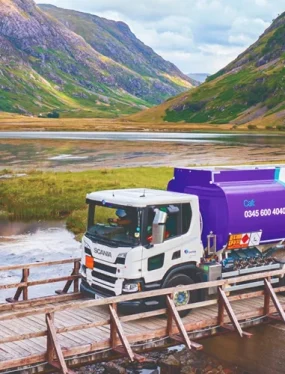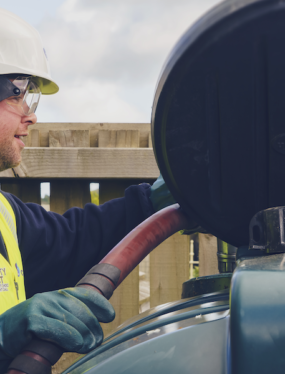The UK government’s announcement of changes to the rules on rebated diesel usage has been a source of confusion and concern across UK businesses and, in particular, the construction sector. As of 1 April 2022, red diesel will no longer be available at a rebated rate for many commercial applications, which covers the majority of use in the construction industry. Government guidelines specify which uses of red diesel will still be permitted, however there is some ambiguity around some applications and usage scenarios. As such, users in construction must actively consider their eligibility in order to ensure compliance, while also working to maintain optimum cost efficiencies. Here are some of the key questions and challenges construction industry professionals may be facing in the run up to the April 2022 deadline.
Why can the construction industry no longer access rebated red diesel?
It is not solely the construction industry, but indeed many current users of red diesel will lose their eligibility to use rebated fuel. This is part of the government’s efforts to meet carbon reduction and air quality targets. Taxing most users at the standard rate for diesel is intended to reflect the impact of the emissions they produce, while promoting energy efficiency and the use of cleaner fuel alternatives.
What are the financial implications of the rule changes?
Red diesel (also known as gas oil) attracts a rebate of 46.81 pence per litre (ppl), giving it an effective duty rate of 11.14ppl. White diesel, or DERV, on the other hand, has no rebate, which means a duty rate of 57.95 ppl. Therefore, making a straight switch from red to white diesel would incur an additional expense of 46.81 pence per litre used — five times as much duty as before. It is clear this will have a significant impact on costs as well as cash flow for many businesses, which is why now is the time to consider fuel options and alternatives, as well as optimal fuel efficiency.
At the same time, construction companies must also contend with a number of challenges including one-off costs in order to stay compliant. These may include the costs of removing or running down red diesel, purchasing additional tanks, vehicles or equipment, sourcing alternatives and more.
Furthermore, as both red and white diesel become yet more attractive targets for theft, the high number of vehicles and large stores of fuel at construction sites are coming under particular threat.
Which disallowed uses for red diesel do construction industry professionals need to know about?
The biggest change will be that heavy construction equipment (non-road mobile machinery – NRMM) of all kinds will no longer be permitted to run on red diesel. Red diesel will also no longer be permitted for commercial heating and power generation, for example for use in generators on construction sites. It is important to note that permissions apply not to types of equipment, but to their specific uses. So for example, equipment that can be used in both an agricultural setting and in a construction setting will still be able to use red diesel, but only when used for agricultural purposes. As such, contractors will not only need supplies of both red and white diesel, but may also need two sets of plant/equipment unless completely flushing tanks and supply lines in between uses.
How can construction companies stay compliant with red diesel rule changes, and how can they demonstrate their compliance?
Construction industry professionals need to make sure that they have run down their existing stocks of red diesel in advance of the 1 April 2022 deadline. It is not necessary to flush tanks to remove every trace, but it is important to be able to prove that red diesel has not been purchased after the April 2022 deadline, or soon before in order to stock up. HMRC auditors will require evidence of previous purchase and usage volumes to evidence no stockpiling. It has therefore never been more important to keep receipts and records in good order and make alternative plans ahead of time.
What are the potential consequences of non-compliance?
The government has indicated the likelihood of spot checks on-site, with significant monetary fines handed out for non-compliance.
What alternatives to red diesel should construction industry professionals consider?
The good news is that there is time for the construction industry to explore alternatives to red diesel. Certas Energy and Scottish Fuels are here to help the sector get ready for 1 April 2022 as the next big milestone on their journey to net zero carbon 2050. As the UK’s leading independent fuels distributor, Certas Energy offers an extensive supply network for both DERV and the cleaner-burning OEM approved drop-in fuel, Shell GTL (gas to liquid) as well as an increasing supply of HVO (hydrotreated vegetable oil). Over the coming weeks and months, Certas Energy will share essential resources for “all things diesel”, with expert insight on the benefits of a variety of clean fuel options, along with step-by-step guidance for construction industry leaders on how to future-proof their energy mix.
Scottish Fuels is here to support your transition from red diesel, no matter how your business is affected by the changes. Get in touch today for free, personalised advice from our friendly, expert team: 0345 300 8844.









